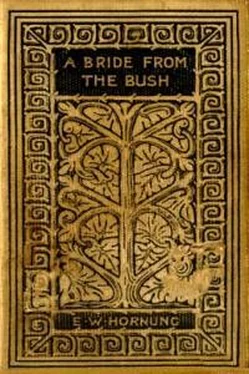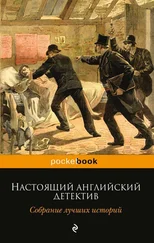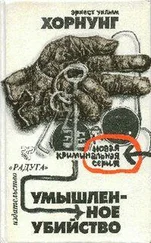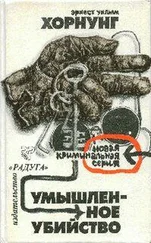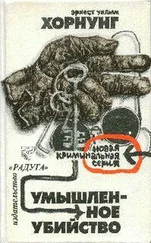"Yes, I do; this reminds me of it more than anything I've seen yet."
"What nonsense, my darling!" said Alfred, laughing. "Why, there is no such green spot as this in all Australia!"
"Ah! you were there in the drought, you see; you never saw the run after decent rains. If you had, you'd soon see the likeness between those big paddocks in what we call the 'C Block' and this. But the road spoils this place; it wants a Bush road; let's get off it for a bit."
So they bore inward, to the left, and Gladys was too thoroughly charmed, and too thoughtful, to say much. And now the cool bracken was higher than their knees, and the sun beat upon their backs very fiercely; and now they walked upon turf like velvet, in the shadow of the trees.
"You don't get many trees like these out there," said Alfred.
"Well—not in Riverina, I know we don't," Gladys reluctantly admitted; and soon she added: "Nor any water–holes like this."
For they found themselves on the margin of the largest of the Pen Ponds. There was no wind, not a ripple could be seen upon the whole expanse of the water. The fierce sun was still mellowed by a thin, gauzy haze, and the rays were diffused over the pond in a solid gleam. The trees on the far side showed fairly distinct outlines, filled in with a bluish smoky gray, and entirely without detail. The day was sufficiently sultry, even for the Thames Valley.
"And yet," continued Gladys, speaking slowly and thoughtfully, "it does remind one of the Bush, somehow. I have sometimes brought a mob of sheep through the scrub to the water, in the middle of the day, and the water has looked just like this—like a great big lump of quicksilver pressed into the ground and shaved off level. That'd be on the hot still days, something like to–day. We now and then did have a day like this, you know—only, of course, a jolly sight hotter. But we had more days with the hot wind, hot and strong; what terrors they were when you were driving sheep!"
"You were a tremendous stock–rider, Gladdie!" remarked her husband.
"Wasn't I just! Ever since I was that high! And I was fond, like, of that old run—knew every inch of it better than any man on the place—except the old man, and perhaps Daft Larry. Knew it, bless you! from sunrise—you remember the sunrise out there, dull, and red, and sudden—to sundown, when you spotted the station pines black as ink against the bit of pink sky, as you came back from mustering. Let's see—I forget how it goes—no, it's like this:—
"'Twas merry 'mid the black–woods when we spied the station roofs, To wheel the wild scrub cattle at the yard, With a running fire of stock–whips and a fiery run of hoofs, Oh, the hardest day was never then too hard!
"That's how it goes, I think. We used sometimes to remember it as we rode home, dog–tired. But it was sheep with us, not cattle, more's the pity. Why, what's wrong, Alfred? Have you seen a ghost?"
"No. But you fairly amaze me, darling. I'd no idea you knew any poetry. What is it?"
"Gordon—mean to say you've never heard of him? Adam Lindsay Gordon! You must have heard of him, out there. Everybody knows him in the Bush. Why, I've heard shearers, and hawkers, and swagmen spouting him by the yard! He was our Australian poet, and you never had one to beat him. Father says so. Father says he is as good as Shakespeare."
Alfred made no contradiction, for a simple reason: he had not listened to her last sentences; he was thinking how well she hit off the Bush, and how nicely she quoted poetry. He was silent for some minutes. Then he said earnestly:—
"I wish, my darling, that you would sometimes talk to my mother like that!"
Gladys returned from the antipodes in a flash. "I shall never talk to any of your people any more about Australia!" And, by her tone, she meant it.
"Why not?"
"Because they don't like it, Alfred; I see they don't, though I never see it so clearly as when it's all over and too late. Yet why should they hate it so? Why should it annoy them? I've nothing else to talk about, and I should have thought they'd like to hear of another country. I know I liked to hear all about England from you , Alfred!"
Faint though it was, the reproach in her voice cut him to the heart. Yet his moment had come. He had decided, it is true, to say nothing at all; but then there had been no opening, and here was one such as might never come again.
"Gladdie," he began, with great tenderness, "don't be hurt, but I'm going to tell you what may have something to do with it. You know, you are apt to get—I won't say excited—but perhaps a little too enthusiastic, when you talk of the Bush. Quite right—and no wonder, I say—but then, here in England, somehow, they very seldom seem to get enthusiastic. Then, again—I think—perhaps—you say things that are all right out there, but sound odd in our ridiculous ears. For we are an abominable, insular nation of humbugs—" began poor Alfred with a tremendous burst of indignation, fearing that he had said too much, and making a floundering effort to get out of what he had said. But his wife cut him short.
The colour had mounted to her olive cheeks. Denseness, at all events, was not among her failings—when she kept calm.
She was sufficiently calm now. "I see what you mean, and I shall certainly say no more about Australia. 'I like a man that is well–bred!' Do you remember how Daft Larry used to wag his head and say that whenever he saw you? 'You're not one of the low sort,' he used to go on; and how we did laugh! But I've been thinking, Alfred, that he couldn't have said the same about me, if I'd been a man. And—and that's at the bottom of it all!" She smiled, but her smile was sad.
"You are offended, Gladys?"
"Not a bit. Only I seem to understand."
"You don't understand! And that isn't at the bottom of it!"
"Very well, then, it isn't. So stop frowning like that this instant. I'd no idea you looked so well when you were fierce. I shall make you fierce often now. Come, you stupid boy! I shall learn in time. How do you know I'm not learning already? Come away; we've had enough of the water–hole, I think."
She took his arm, and together they struck across to Ham Gate. But Alfred was silent and moody; and the Bride knew why.
" Dear old Alfred," she said at last, pressing his arm with her hand; "I know I shall get on well with all your people, in time."
"All of them, Gladdie?"
"At any rate, all but Granville."
"Still not Gran! I was afraid of it."
"No; I shall never care much about Gran. I can't help it, really I can't. He is everlastingly sneering, and he thinks himself so much smarter than he is. Then he enjoys it when I make a fool of myself; I see he does; and—oh, I can't bear him!"
A pugnacious expression came into Alfred's face, but passed over, and left it only stern.
"Yes," he said, "I know his infernal manner; but, when he sneers, it's only to show what a superior sort of fellow he is; he doesn't mean anything by it. The truth is, I fear he's becoming a bit of a snob; but at least he's a far better fellow than you think; there really isn't a better fellow going. Take my word for it, and for Heaven's sake avoid words with him ; will you promise me this much, Gladdie?"
"Very well—though I have once or twice thought there'd be a row between us, and though I do think what he'd hear from me would do him all the good in the world. But I promise. And I promise, too, not to gas about Australia, to any of them for a whole week. So there."
They walked on, almost in silence, until Ham Common was crossed and they had reached the middle of the delightful green. And here—with the old–fashioned houses on three sides of them, and the avenue of elms behind them and the most orthodox of village duck–ponds at their feet—Gladys stopped short, and fairly burst into raptures.
Читать дальше
